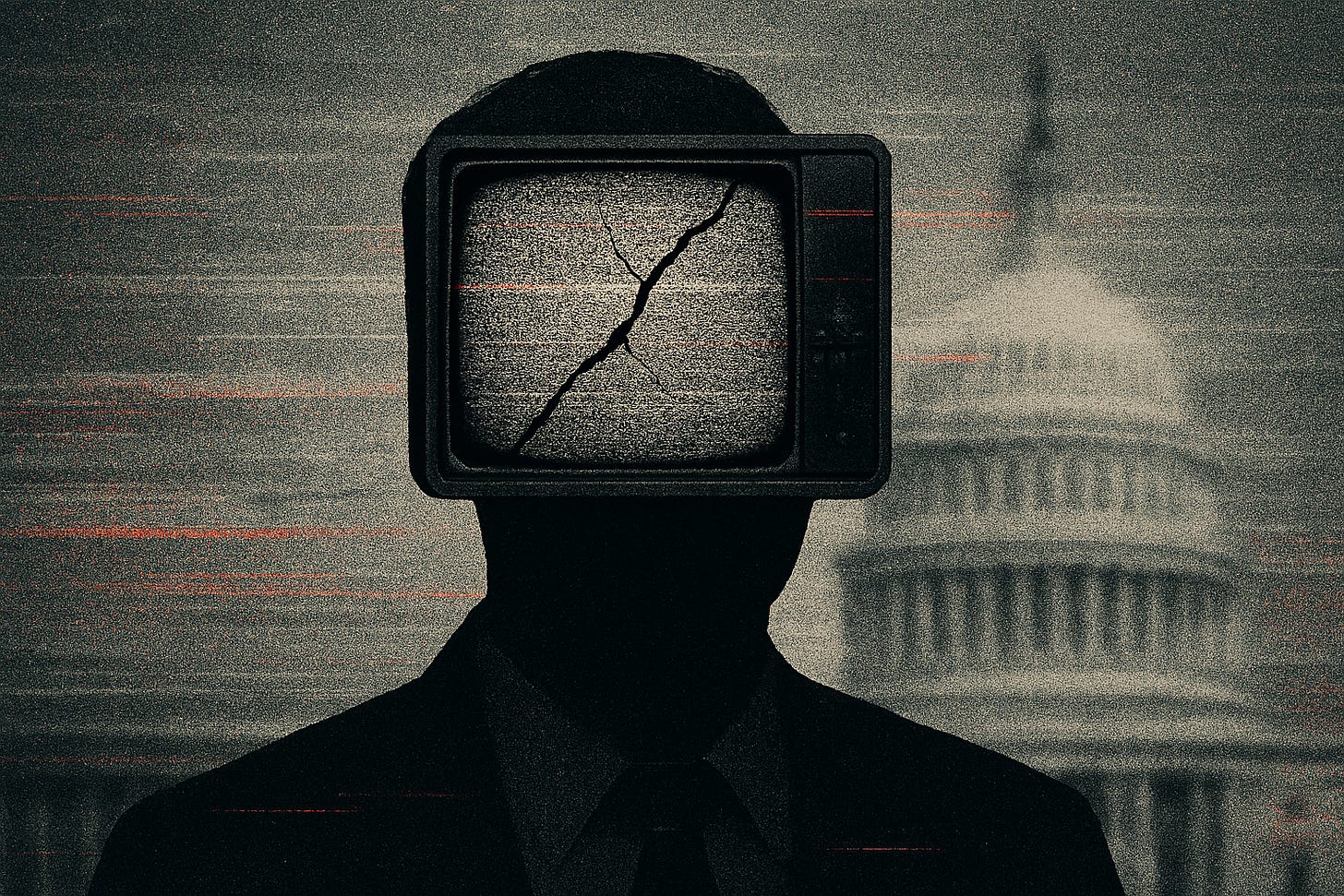Since the tragic assassination of conservative activist Charlie Kirk on September 10th at Utah Valley University, I’ve started and abandoned multiple pieces trying to make sense of this nightmarish event and what it means for America’s future politically. My initial impulse was to publish something immediately—perhaps hoping to capture some of the attention while the story was breaking. But as wild theories began proliferating in the days that followed, I’m glad I waited. Much of the information landscape has become so chaotic and convoluted that separating fact from fiction becomes all but impossible.
The basic facts are stark enough: Kirk was shot in the neck by a gunman positioned on a rooftop approximately 142 yards away while engaging with an audience member about mass shootings. The shooter climbed onto a rooftop around noon, fired the fatal shot, then jumped off and fled, leaving behind a gun and ammunition in a wooded area near the university. Kirk, 31 and father of two, founder of Turning Point USA, was pronounced dead shortly after at a nearby hospital.
After a 30-plus-hour manhunt, the suspect, 22-year-old Tyler Robinson, surrendered peacefully at a local sheriff’s office, accompanied by his parents. Robinson now faces seven counts and prosecutors are seeking the death penalty.
Competing Narratives, Lacking Evidence
Two primary conspiracy theories have dominated social media discussions, both equally unfounded and dangerous in their implications. What’s particularly frustrating is how quickly these theories gained traction despite clear evidence pointing elsewhere. Within hours of the shooting, before Robinson was even identified, social media was flooded with speculation that completely ignored the emerging facts.
The first blames Israel, claiming the country orchestrated Kirk’s death after he began questioning Israeli tactics in Gaza and Jewish involvement in certain leftist causes. Despite my commitment to keeping an open mind, those pushing this theory have provided zero credible evidence connecting Israel to the assassination. The claims seem to originate primarily from people who’ve only recently gotten “red-pilled” and are making accusations without any substantial basis.
The second theory, somehow even more conspiratorial, suggests Kirk’s assassin was a “groyper”—a follower of Nick Fuentes who allegedly killed Kirk for not being sufficiently right-wing. This narrative implies that Fuentes actively advocates political violence, which is demonstrably false. In recent months, Fuentes has consistently worked to de-escalate tensions and find peaceful solutions to political disagreements. When pressed for evidence supporting this groyper theory, proponents offer nothing more than obscure references to online meme culture.
Both theories conveniently ignore the growing body of evidence about the actual perpetrator and his motivations.
Historical Context vs. Current Reality
I’m typically skeptical of mainstream media narratives, but we need to distinguish between well-documented historical events and current speculation. The connections between Israel and events like JFK’s assassination or 9/11 involve tangible evidence and clear motives—Israel gained significantly from both events in terms of their political interests.
But what exactly would Israel gain from Charlie Kirk’s death? Yes, Kirk had begun questioning Israeli tactics under Netanyahu’s government, but he remained a die-hard Israel supporter until his death. His criticism was mild compared to actual Israel hawks who face no consequences. If Israel were targeting American political figures, there are far more prominent critics—Tucker Carlson, Candace Owens—who would logically be higher on any theoretical hit list. Why would Israel overlook such vocal detractors but target Kirk for asking relatively mild questions about long-term policy goals?
Moreover, Kirk’s death has actually amplified criticism of Israel among his follower base. If this were some calculated geopolitical move, it backfired spectacularly. The conspiratards can’t explain this obvious contradiction in their narrative.
Ironically, Owens and Carlson happen to be among the biggest names promoting the Israel theory. But I’m sure that’s just a coincidence.
The Left’s Predictable Deflection
The “groyper conspiracy” represents a more familiar pattern: the left doing what it always does when confronted with the consequences of its own rhetoric. Rather than examining how years of cultivating violent, de-humanizing sentiment might have contributed to this tragedy, they’re desperately trying to shift blame onto any convenient target they can find.
This deflection is particularly cynical given what has been revealed about Robinson’s actual background. He had been active on social media platforms frequented by antifa sympathizers, not groyper communities. His digital footprint shows consumption of mainstream progressive content that regularly demonized conservatives like Kirk. Yet somehow we’re supposed to believe this was a right-wing false flag operation. Get real.
The groypers became easy scapegoats due to their public feud with Kirk dating back to the “Groyper War” of 2019, when Fuentes supporters attended TPUSA events to challenge Kirk’s positions on particular culture war issues. But this history actually undermines the conspiracy theory—despite years of political opposition, the groypers always had the decency to engage Kirk “in the realm of ideas.” They sought to win debates, not eliminate opponents.
Kirk’s actual killer, and the thousands who celebrated his death online, have no interest in winning hearts and minds through debate. They don’t believe in free expression or democratic discourse. They believe in violence.
The evidence suggests Robinson had developed what authorities describe as an “obsession” with Kirk. Bullet casings found at the scene were inscribed with anti-fascist messages, including “Hey fascist!” — clearly indicating a political motive. Yet even with this evidence pointing to left-wing extremism, we’re still seeing desperate attempts to pin blame elsewhere.
The Double Standard Problem
What’s most galling is watching the same people who created our current “cancel culture” environment suddenly develop amnesia about their own tactics. For over a decade—essentially since Trump’s first campaign—the American left has enforced strict censorship against a swathe of mainstream conservative viewpoints. Thousands of Americans with perfectly rational political views have had their lives destroyed through systematic harassment: threats, targeted campaigns, reputational assassination, employment blacklisting.
Even now, despite clear evidence of Robinson’s anti-fascist motivations and his apparent obsession with Kirk, Vice President JD Vance had to carefully frame the incident as involving “left-wing extremism” while official investigations continue. Meanwhile, conspiracy theories about Israel and groypers spread unchecked on social media for days.
The contrast is telling: when actual evidence points to left-wing political violence, officials speak cautiously and wait for investigations. But when conservatives are even tangentially linked to violence—often with far less evidence—the condemnations come swift and unequivocal. Remember how quickly the media and politicians blamed Sarah Palin’s campaign map for the Gabby Giffords shooting, despite zero evidence connecting the two? Yet here we have bullet casings literally inscribed with anti-fascist slogans, and the response is still measured restraint.
These are the same tactics that everyday conservatives have endured for years. So forgive me if I’m not particularly sympathetic when these people face consequences for celebrating political murder. Why should only one side be held to standards of civil discourse when the other has repeatedly proven it will use any tactics available, regardless of our restraint?
Moving Forward
If liberals want this cycle of escalation to stop, they need to engage in genuine self-reflection rather than doubling down on Trump derangement syndrome. Their obsessive hatred has become so entrenched in progressive thought that serious introspection seems virtually impossible.
The Robinson case should be a clear wake-up call: a 22-year-old became so consumed with trans and anti-fascist ideology that he felt justified in assassinating a conservative activist. The FBI offered a $100,000 reward for information leading to his capture. Students at Utah Valley University are still processing the trauma of witnessing such a horrific act of political violence on their campus. Yet instead of confronting what their rhetoric has wrought, we see continued deflection and conspiracy theorizing.
What makes this especially tragic is that Kirk was killed while discussing school safety—a topic that should unite rather than divide us. The irony would be almost laughable if it weren’t so utterly devastating. A man advocating for protecting students was murdered on a college campus by someone who apparently saw him as a threat to democracy.
Until we establish clear standards—where people who celebrate political assassinations face real consequences—our democratic discourse will continue deteriorating. If we can’t agree that mocking the death of someone committed to free expression and democratic debate is fundamentally evil, then our society’s future looks genuinely hopeless.
The death of Charlie Kirk should be a wake-up call about where our political culture is heading. Instead, it’s become another opportunity for conspiracy theories and partisan point-scoring. The American people are better than this—or at least, we used to be.



